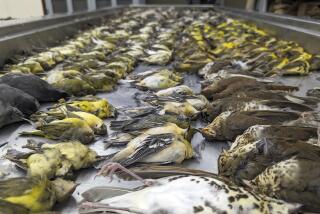Officials Study Bird Kills From Wind Turbines
- Share via
BISMARCK, N.D. — Wind turbines are getting a close look as an energy source, but wildlife officials do not want the devices to be a source of problems for birds and waterfowl.
Dead cormorants, gulls, owls, pelicans and songbirds are found daily beneath the electrical transmission towers across the Lake Audubon causeway near Underwood, said Dave Potter, Audubon Wildlife Refuge manager.
The development of wind turbines in North Dakota, potentially as many as 2,000 towers within the next decade, has the potential to agitate more birds.
Mike McEnroe, a wildlife biology supervisor for the U.S. Fish and Wildlife Service in Bismarck, said his agency is working with wind developers on the issue while the industry is still in its infancy.
Birds can die from hitting towers and guy wires. Some evidence suggests wind turbines disturb bird nesting and reproductive habits, McEnroe said.
A few plans have emerged from meetings with the North Dakota Sustainable Energy for Economic Development group, McEnroe said.
They include assurances that latticework turbine supports will be replaced by a tubular construction that is less of a threat to birds.
Scot Kelsh, spokesman for the wind energy group known as SEED, said wildlife officials’ main worry is that the birds’ mating rituals will be disturbed.
There are no known recent studies on bird strikes in the state. A 1970s study of the 1,200-foot federal Omega tower near LaMoure found 1,000 birds were killed each spring and fall from striking the tower and guy wires.
More to Read
Sign up for Essential California
The most important California stories and recommendations in your inbox every morning.
You may occasionally receive promotional content from the Los Angeles Times.










